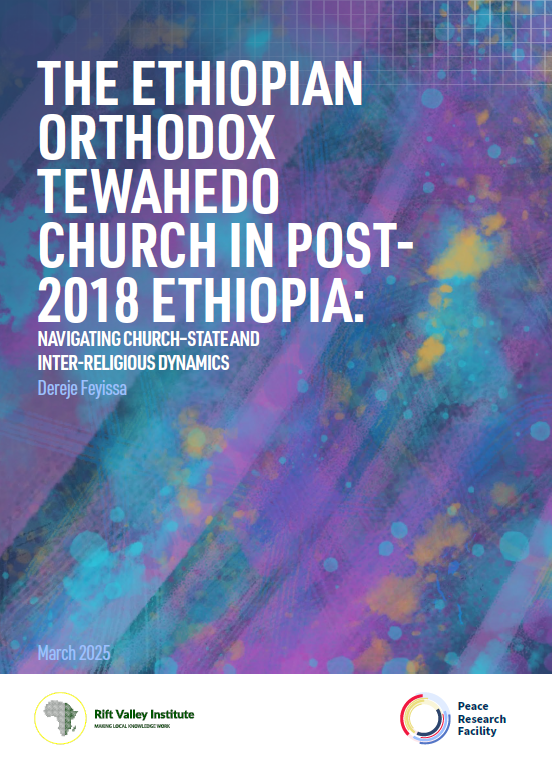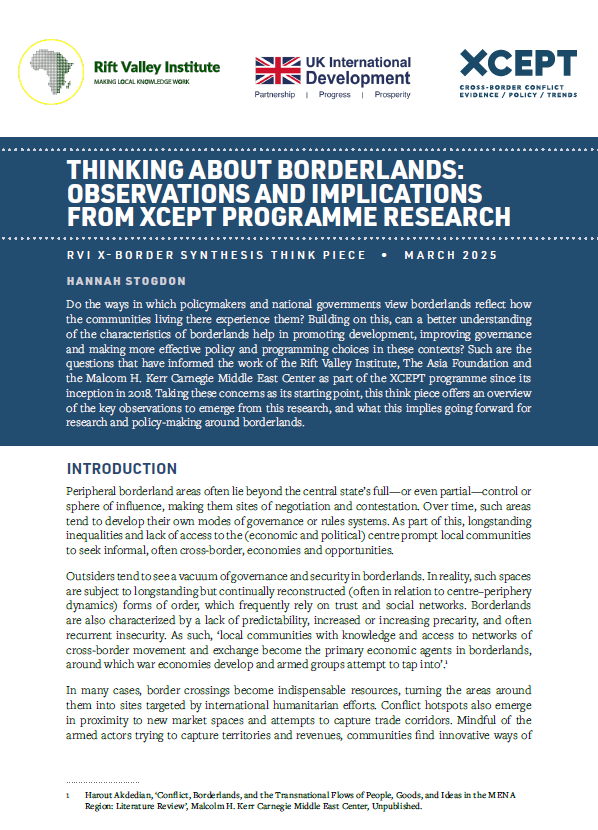In early January 2014, al-Jazeera correspondent Mohammed Adow was expelled from South Sudan for reporting on the anti-government advance on the capital, Juba. In December 2013, at a meeting of the Nairobi Forum, Adow discussed his recent documentary, Not Yet Kenyan, which aired on Al Jazeera English Channel on 14 November, not long after the Westgate attack. The documentary brought to the fore a divide in Kenyan society, revealing a history of discrimination since independence against ethnic Somalis in North Eastern Kenya.
Born and raised in Garissa County in northeast Kenya, Mohammed Adow witnessed at first hand the political and economic marginalisation of this part of Kenya. For Not Yet Kenyan he went back to see how the region and its people had survived and started to prosper, only to find that Kenya’s intervention in Somalia and the actions of al-Shabaab are threatening to throw the region into turmoil again.
During the meeting RVI fellow Justin Willis, Professor in History at the University of Durham, talked with Mohammed Adow about his experiences and the story behind this documentary. They discussed the issues with Dr Ekuru Aukot, a Constitutional Lawyer, who hails from Turkana in northwest Kenya.
‘We Are Not From Another Continent’
The opening shots of Not Yet Kenyan show newsreel footage from the Westgate attacks. At the time, Mohammed Adow recollected, he was working in Maiduguri in northern Nigeria covering Boko Haram. He was shocked by what he saw on the news. “I did not think, after the promulgation of the new constitution—with the ‘new Kenya’ we had—that this could actually take place.” He was struck by scenes of the military who “went on a rampage in Garissa” the day following the Westgate attacks; he realized he needed to document what was happening there.
He knew what he wanted to achieve. First, he said, “I wanted to tell the story of my life.” “People who grew up [in Garissa] know how easy it is for a policeman or a security official to just slap somebody” Secondly, he wanted to bring a region and a group of people that exists only in the subconscious of most Kenyans into the light of national attention, “You know, we are not migrants, we are not from another continent, we are not from another country—we are living in our ancestral land.”
The filming took over just two weeks. There were revealing interviews with government officials, he said, but “there were people who refused to speak to us, both government officials and members of the public who were fearful of repurcussions if they spoke.”
Introducing the discussion Justin Willis noted that the film was a “long-term reflection on Mohammed’s experience, and the experience of a community in Kenya.” “If I may for a moment play Devil’s advocate,” he asked, “is this not partly also the story of a community which has refused to integrate?” He pointed to people in Adow’s documentary who articulated the idea that joining Kenya was “a mistake”, and cited the not uncommon view that “Somalis don’t actually want to be Kenyan”.
“I don’t think you kill anybody who refuses to integrate,” said Adow. The lack of integration, he said, could be ascribed to religious and cultural differences. “I don’t know of any Somali,” he said, “who would want his daughter to be married to somebody who comes from another religion.” The same principle applied to issues of nightclubs and alcohol, which are incompatible with Somali beliefs.
In terms of making friends, he said, integration was not necessarily an issue. Somalis just like banding together. This explained the presence of so many Somalis in particular suburbs of Nairobi, South C and Eastleigh.
And the experience of marginalization was not just a Somali issue, he said, pointing to the experience of the Turkana, the Samburu, the Pokot, and others. These communities have had similar experiences to Somalis. So there are other marginalized Kenyans.“But when you look at the marginalization in totality,” he said. ”the Somalis take the gold trophy.”
Asked what it would take for people in Garissa or Wajir to feel that the Kenyan government is theirs, Adow said “people would need to consider themselves to have been embraced, to have been taken in, and brought in from the cold.” As long as all Somalis are blamed for the crimes of a few, this could not happen. Above all, he said, Somalis would feel Kenya is theirs “when criminals are treated as criminals within society, and when the actions of a few are not treated as the actions of all.”
A tale of two Kenyas
Ekuru Aukot characterised Adow’s film as the story of two Kenyas–the Kenya in the north and the “other” Kenya. But there were other ways of defining the two Kenyas. “We may want to define that ‘other’ Kenya as the Kenya which is fifty kilometers either side of the Railway.” The disparity between the two Kenyas is tangible, he argued, in material and political terms. “You see it in terms of development, in terms of the presence or absence of the state, so that in northern Kenya you see only a symbolic state.”
And beyond the two Kenyas narrative, he argued, the film shows a more fundamental problem. The difficult locating the ‘other’ Kenya is that all forty-two ethnic groups in Kenya could really claim to be different Kenyas. “There is really no nationhood we can speak of in Kenya”, he said. “We can only speak of the conglomerate of ethnic identities pretending to be a nation state.” The idea of Kenya is best understood, he added, as an “abstract reality”. For nomadic pastoralists who view Kenya through porous borders the concept of Kenyan is yet to be developed.”
Adow’s film, Ekuru noted, shows how peoples close to the center are treated differently to those on the sidelines. In northern Kenya, for instance, the fighting between communities is dismissed as “tribal conflict” instead of being called murder or manslaughter or malicious damage to property. “No-one,” he said, “has been prosecuted for the Wagalla and Garissa massacres, despite the knowledge of the identity of some of the culprits.” Massacres in northern Kenya are tragically frequent occurrences, yet rarely is there a robust government response of the kind seen in the case of the Westgate Mall attack. “A lot of us from northern Kenya are experiencing terrorism every day. Westgate happens every day in northern Kenya.”
Ekuru said that people in northern Kenya had perfected what he called “the art of lamentation”, yet they too hold some responsibility for the state of things. “Think about who is killing who in northern Kenya,” he said, “The poor are killing the poor,” he explained, drawing attention to the “clan factor”.
Discussion
Yusuf Hassan, MP for Kamukunji, explained the historical roots of the current marginalization of Somalis in Kenya. This, he said, began at independence in 1963 when, “we were completely a nation within a new state.”
Senator Billow Kerrow noted that discrimination against Kenyan Somalis is based on the perception that if, you are a Somali, you don’t belong. He added that collective punishments against the Somali community are a continuing phenomenon. Another member of the audience called for the highlighting of human rights abuses in other parts of Kenya, noting that such abuses are not limited to the north.
Abdikadir Omar Aden, the MP for Balambala constituency in Garissa, said that there is a need to avoid repeating past mistakes. Ekuru Aukot called for the implementation of report of the Truth, Justice and Reconciliation Committee, which among other findings, highlighted historical injustices that were committed in northern Kenya, including the Wagalla massacre, and demanded the prosecution of those responsible.
Another participant questioned the divisions among leaders and politicians from northern Kenya. Ekuru Aukot criticized leaders from the region who had neglected their constituencies. “As soon as you get engulfed in these alliances, you forget about your people, and you are compromised,” he said. Having leaders from the northern region in power, one participant pointed out, has not prevented atrocities from being committed.
What does It mean to be Kenyan, the speakers were asked. Ekuru Aukot said “to be Kenyan is to enjoy what other people enjoy. Maybe I’ll be Kenyan if we begin to see the actual implementation of the constitution.”


